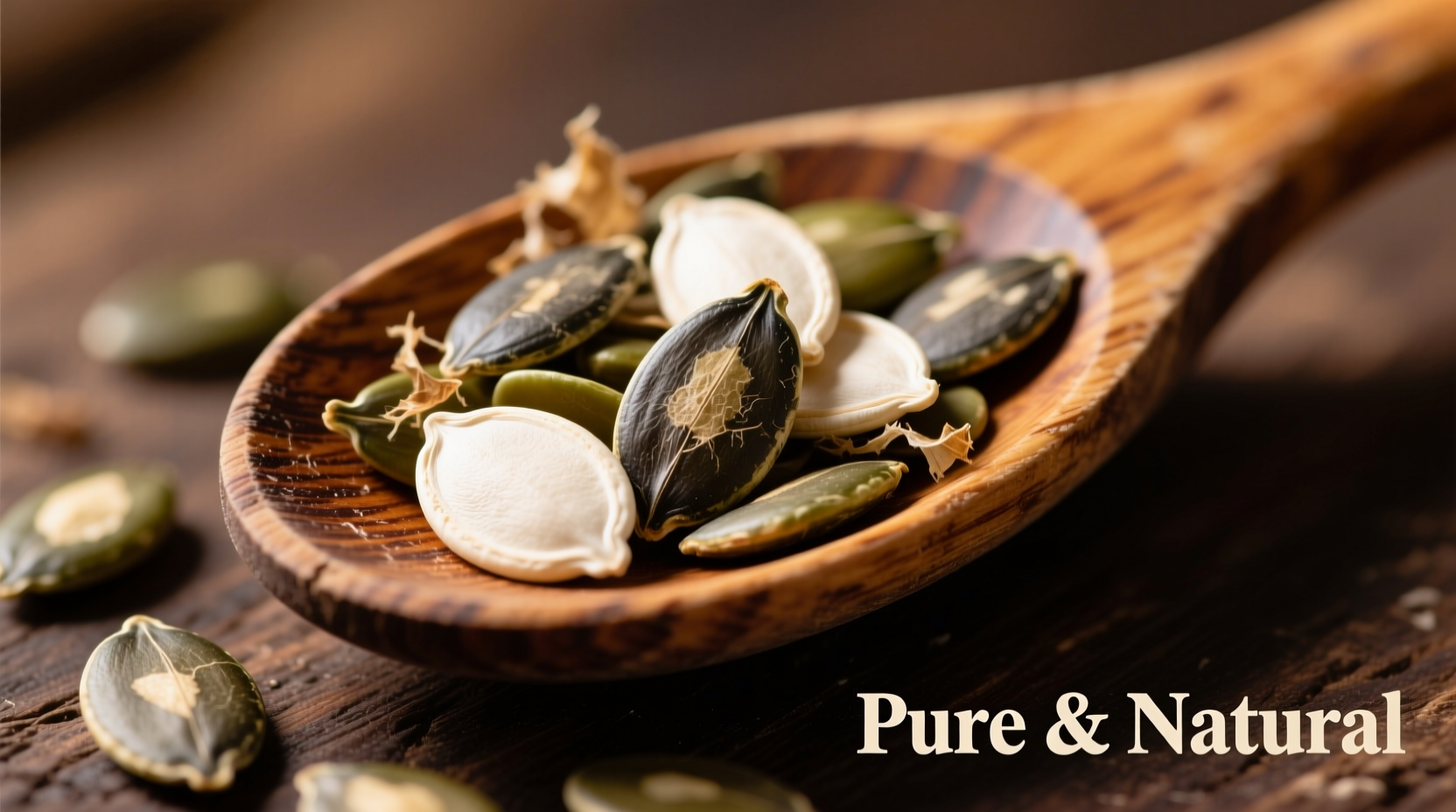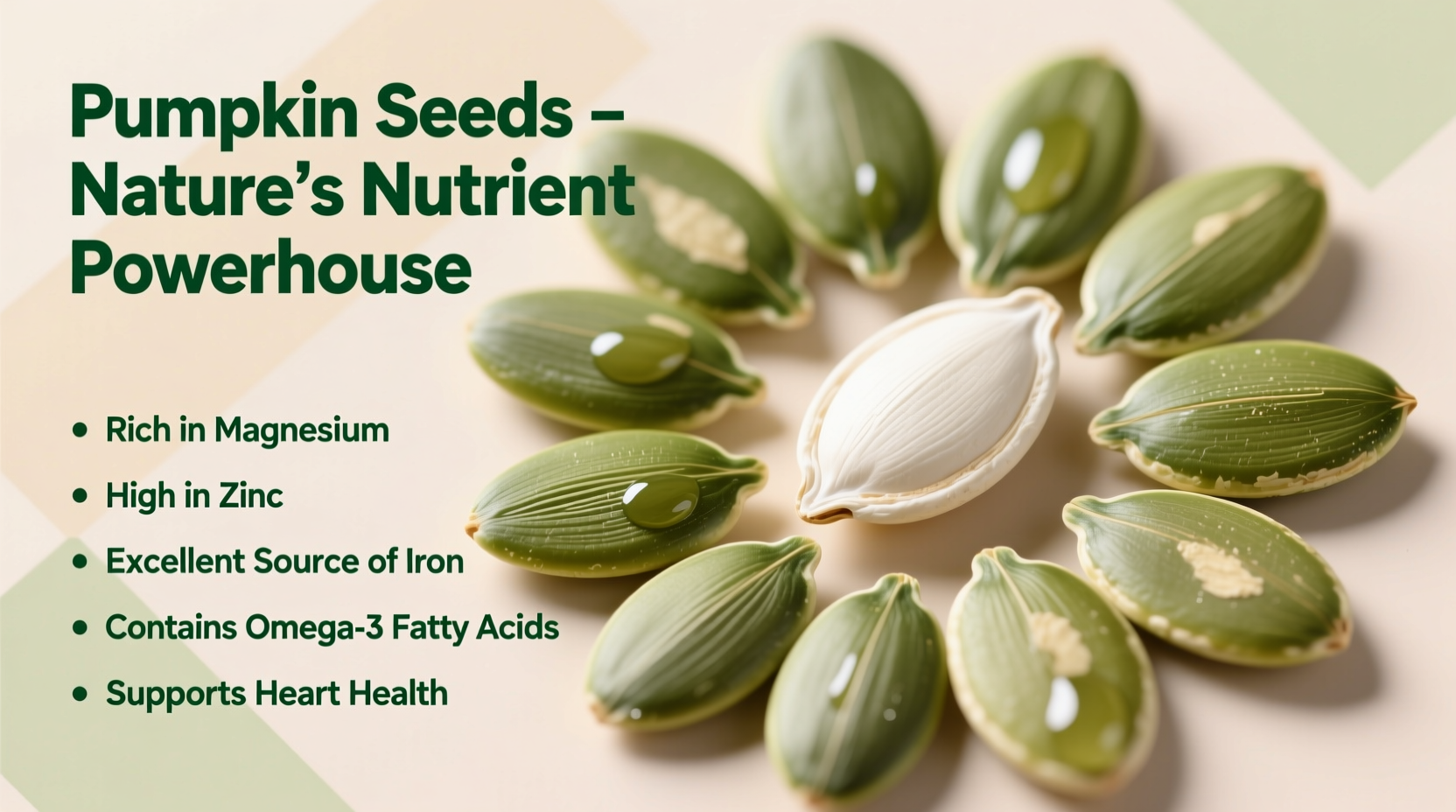When you're looking for a nutrient-dense snack that delivers measurable health benefits, pumpkin seeds stand out as one of nature's most complete packages. Unlike many processed snacks that offer empty calories, these small seeds pack a powerful combination of essential minerals, healthy fats, and plant compounds that work synergistically in your body.
What Makes Pumpkin Seeds a Nutritional Powerhouse
Understanding the complete nutritional profile of pumpkin seeds requires looking beyond basic calorie counts. These seeds contain a unique combination of nutrients that work together to deliver health benefits you won't find in most processed foods. The magic happens in the balance between minerals like magnesium and zinc, healthy fats, and specialized plant compounds that scientific research continues to uncover.
| Nutrient | Amount per 1 oz (28g) | % Daily Value |
|---|---|---|
| Calories | 151 | 8% |
| Protein | 7g | 14% |
| Fat | 13g | 17% |
| Carbohydrates | 5g | 2% |
| Fiber | 1.7g | 6% |
| Magnesium | 151mg | 37% |
| Zinc | 2.2mg | 20% |
| Iron | 2.5mg | 14% |
| Potassium | 262mg | 6% |
Data sourced from the USDA FoodData Central database (2023 update) provides the most current nutritional analysis of raw pumpkin seeds (pepitas). This official government resource tracks nutrient composition across thousands of food items, offering reliable data for health professionals and consumers alike.
7 Science-Backed Health Benefits You Should Know
Heart Health Support Through Multiple Pathways
Pumpkin seeds deliver heart-protective benefits through several mechanisms. Their magnesium content helps regulate blood pressure, while the healthy fats (primarily monounsaturated and polyunsaturated) improve cholesterol profiles. Research published in the Journal of Nutrition and Metabolism found that regular pumpkin seed consumption significantly reduced LDL cholesterol and triglyceride levels in study participants.
Prostate Health Benefits for Men
The zinc concentration in pumpkin seeds makes them particularly valuable for men's health. A comprehensive review in the World Journal of Urology noted that pumpkin seed oil supplementation showed promising results for managing benign prostatic hyperplasia (BPH) symptoms. The seeds' phytosterols also contribute to prostate health by potentially reducing inflammation.
Natural Sleep Quality Improvement
If you struggle with sleep, pumpkin seeds might offer natural relief. They contain tryptophan, an amino acid that converts to serotonin and melatonin in your body. Additionally, their magnesium content helps regulate neurotransmitters involved in sleep. A study in European Neurology demonstrated that magnesium supplementation improved both sleep quality and duration in older adults with insomnia.
Blood Sugar Regulation Capabilities
Despite containing carbohydrates, pumpkin seeds have a minimal impact on blood sugar due to their high fiber and healthy fat content. Research in Diabetes, Metabolic Syndrome and Obesity showed that pumpkin seed supplementation improved insulin regulation in type 2 diabetes patients. The seeds' antioxidants also help protect against oxidative stress associated with diabetes complications.
Bone Health Support Beyond Calcium
While calcium gets most of the attention for bone health, pumpkin seeds deliver several other crucial bone-supporting nutrients. Magnesium works with calcium to build bone density, while zinc and copper play essential roles in bone formation and maintenance. According to data from the National Osteoporosis Foundation, adequate magnesium intake correlates with higher bone mineral density.
Antioxidant and Anti-Inflammatory Effects
Pumpkin seeds contain various antioxidants including vitamin E, carotenoids, and phenolic compounds. These work together to combat oxidative stress and reduce inflammation throughout the body. A 2022 study in Antioxidants found that pumpkin seed extracts demonstrated significant free radical scavenging activity, potentially reducing risk factors for chronic diseases.
Mental Health and Cognitive Benefits
The combination of magnesium, zinc, and healthy fats in pumpkin seeds supports brain health. Research suggests these nutrients may help reduce symptoms of anxiety and depression while supporting cognitive function. The National Institute of Mental Health recognizes the importance of dietary minerals like magnesium in neurological health and mood regulation.
Maximizing Nutrient Absorption: Practical Tips
How you prepare and consume pumpkin seeds significantly impacts their nutritional benefits. Understanding these practical considerations helps you get the most from this superfood:
Raw vs. Roasted: Nutrient Preservation
Raw pumpkin seeds retain the highest nutrient levels, but light roasting (below 170°F/77°C) preserves most nutrients while enhancing flavor. High-heat roasting can damage heat-sensitive compounds like certain antioxidants. For maximum benefit, choose raw or very lightly roasted seeds without added oils or salt.
Soaking and Sprouting Benefits
Soaking pumpkin seeds overnight in salted water reduces phytic acid, which can inhibit mineral absorption. This traditional preparation method, documented by food science researchers at University of Minnesota Extension, increases the bioavailability of zinc, iron, and magnesium by 20-30%.
Strategic Food Pairing
Combine pumpkin seeds with vitamin C-rich foods like citrus fruits or bell peppers to enhance iron absorption. The healthy fats in pumpkin seeds also help your body absorb fat-soluble vitamins from other foods consumed in the same meal.

Pumpkin Seeds vs. Other Seeds: When to Choose Which
While all seeds offer nutritional benefits, understanding their differences helps you make informed choices based on your specific health goals:
| Nutrient | Pumpkin Seeds | Chia Seeds | Flax Seeds | Sunflower Seeds |
|---|---|---|---|---|
| Zinc (per oz) | 2.2mg | 1.0mg | 1.0mg | 1.5mg |
| Magnesium (per oz) | 151mg | 95mg | 79mg | 92mg |
| Omega-3 (per oz) | 0.1g | 4.9g | 6.4g | 0.03g |
| Fiber (per oz) | 1.7g | 9.8g | 7.6g | 3.0g |
| Best For | Zinc needs, prostate health | Fiber, omega-3s | Omega-3s, digestive health | Vitamin E, skin health |
This comparison highlights why pumpkin seeds stand out for zinc and magnesium content compared to other popular seeds. While chia and flax lead in omega-3 fatty acids, pumpkin seeds offer superior mineral density for specific health concerns.
Practical Incorporation Strategies for Daily Consumption
You don't need large quantities to benefit from pumpkin seeds. Here's how to incorporate them effectively into your daily routine:
- Optimal serving size: 1-2 ounces (28-56g) daily provides substantial benefits without excessive calories
- Morning boost: Add 1 tablespoon to oatmeal or yogurt for sustained energy
- Lunch enhancement: Sprinkle over salads for crunch and nutrient density
- Smart snacking: Keep portion-controlled bags (1 oz) for between meals
- Creative cooking: Blend into pesto, energy balls, or baked goods for hidden nutrition
Important Considerations and Limitations
While pumpkin seeds offer numerous benefits, understanding these context boundaries ensures safe and effective consumption:
Calorie awareness: At 151 calories per ounce, they're nutrient-dense but can contribute to weight gain if consumed in excess. Measure portions rather than eating directly from the bag.
Oxalate content: Pumpkin seeds contain moderate oxalates (about 80mg per ounce). Individuals with kidney stone history should moderate intake and pair with calcium-rich foods to reduce absorption.
Allergy considerations: Though less common than nut allergies, seed allergies do occur. Introduce gradually if you have known seed sensitivities.
Storage recommendations: Keep in airtight containers in the refrigerator or freezer to prevent rancidity of healthy fats. Properly stored, they maintain freshness for 3-6 months.
Frequently Asked Questions
How many pumpkin seeds should I eat daily for health benefits?
One ounce (28g or about 1/4 cup) daily provides optimal benefits without excessive calories. This amount delivers significant zinc, magnesium, and healthy fats while fitting within balanced dietary patterns. Consuming more than 2 ounces daily may lead to excessive calorie intake for some individuals.
Are roasted pumpkin seeds as nutritious as raw?
Lightly roasted pumpkin seeds retain most nutrients, but high-heat roasting can degrade heat-sensitive compounds. Raw seeds offer maximum nutrient retention, while roasting below 170°F preserves most benefits. Avoid seeds roasted in oil or with added salt for optimal health benefits.
Can pumpkin seeds help with sleep problems?
Yes, pumpkin seeds contain tryptophan and magnesium, both supporting sleep regulation. Consuming 1 ounce about 1 hour before bed may improve sleep quality. Research shows magnesium deficiency correlates with insomnia, and pumpkin seeds provide 37% of your daily magnesium needs in one serving.
Do pumpkin seeds really support prostate health?
Clinical research supports pumpkin seeds' benefits for prostate health. Their high zinc content (20% DV per ounce) and phytosterols help reduce inflammation and support healthy prostate function. A study in World Journal of Urology found pumpkin seed oil supplementation improved symptoms of benign prostatic hyperplasia.











 浙公网安备
33010002000092号
浙公网安备
33010002000092号 浙B2-20120091-4
浙B2-20120091-4